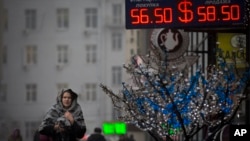The official exchange rate was still in the 60s, and the sign on the currency exchange kiosk's door said there were U.S. dollars on sale at 80 rubles. The woman at the window wanted 85.
At the exchange points that are a fixture across the Russian capital, those seeking dollars to protect their savings from the ruble’s collapse were forced to pay more than 20 percent above the plunging official exchange rate on Tuesday.
A shocking overnight hike in the interest rate failed to rescue a currency driven sharply lower by falling oil prices, the threat of recession and economic sanctions imposed over Ukraine.
The rate fell at its fastest pace in 16 years. For the first time since the catastrophic 1990s, currency exchange points were updating their signs hourly to match pace with the ruble's fall. There was no guarantee they would offer dollars at the listed price.
"Things change every minute. People come and take whatever anyway. No one wants to be left with rubles now," said a worker at one currency exchange point who declined to be identified.
"We have dollars but there is no point in selling them cheap now: We'd be making losses soon. We don't want to be left with rubles either."
Spreads at currency exchange points, usually no more than a percent or two above the official rate, widened throughout the day.
The last ruble crash in 1998 wiped out the financial system and helped propel Vladimir Putin to power. Until now, currency stability had been a hallmark of his 15-year rule.
Dollar's price soars
It is not clear how hard the savings of ordinary Russians will be hit this time around: Many already kept their savings in hard currency after the 1990s turmoil. Others have switched to dollars in recent months while the central bank was spending billions buying up rubles to stave off the crash.
The dollar’s price on Moscow's streets is roughly triple what it was as the year began.
So far, the situation has not reached the panic point of 1998, when the government defaulted on domestic debt and many banks delayed payments to depositors, who gathered in unruly crowds. At the peak of the crisis then, exchange points stopped offering dollars at any price, putting up signs saying "dollarov nyet."
People said they expect harder times ahead.
"We have not yet raised prices, but it looks unavoidable. I guess we'll do it as of New Year. I'm bracing for a repeat of 1998," said Alina Korshunova, a manager at a restaurant serving Uzbek food in central Moscow.
"Usually, we would have December full of end-year corporate events. Now even this has dried up. That's what happens when the whole country has nothing but oil. I hope we won't have to lay off staff," she said.
Olga, an architect in her 50s walking out of a bank, said she had long ago lost faith in financial institutions.
"The problems have been growing for a long time now. I don't think this whole Ukraine affair is the reason really," she said. "The rich have no idea how the poor live, corruption is rife, and all public contracts are fixed. It just had to crash."





